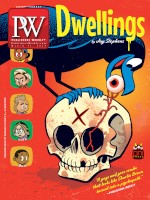In When The Clock Broke (FSG, June), political essayist Ganz studies the failed right-wing populism on the fringe of the 1992 presidential election.
This book has its origins in a 2018 Baffler essay. How did it develop into something bigger?
It was like pulling on a thread. Rick Perlstein wrote a piece for the New York Times Magazine in 2017 where he said the right wing’s marginal and kind of crazy characters were much more important to its history than he had thought. So I took this as a research project. I had found this article “Right Wing Populism” by Murray Rothbard from 1992, and it really was eye-opening for me. It was about David Duke’s run for governor of Louisiana and how Rothbard applied it just a few months later to Pat Buchanan’s run for the presidency, which he was intimately involved in. He had this idea of a demagogue who would short circuit the media and freak out the ruling elites, and it was just this uncanny description of Trumpism. Then Charlottesville happened, and it turned out all of these Nazi guys had read Murray Rothbard, so I wrote a piece for the Baffler on Murray Rothbard and eventually that piece on right wing populism in general, which is when I realized, “Oh, this was a movement”—one that was very much trying to push the Republican Party in the direction that it finally, conclusively, catastrophically took with Trump.
What fed into the support for bigoted candidates like Buchanan and Duke?
The economy was changing, partly from deindustrialization, partly from immigration and women entering the workplace. People did not have the same expectations of security and growth. They felt betrayed, like they didn’t recognize the country anymore.
How was right-wing populism written about at the time?
Newspaper writing at the time was quite good. It registered something strange happening in the country: that people were very angry, that there were forces rearing their heads that hadn’t been seen in 50 years. But it went from “What is going on?” to “Oh, it seems to have worked out” once the economy improved, once Bill Clinton won. “Maybe those things weren’t as big a deal as we thought they were. Maybe that was just a bit of craziness.” But it all went subterranean. There were deeper currents.
How did the rhetoric compare to today’s?
Today’s would have been a lot more polarizing back then. There’s something almost quaint about how the anger was expressed from the margins. In my book, I think you see hints of really pathological things. But, Ross Perot—I mean, obviously he was a phony and maybe even a crook, but he acted very benign and folksy. And Duke, who is a literal Nazi and says horrible things, sounded deceptively reasonable then compared to Trump today, because he paid lip service to American ideas of fairness and so forth. Trump doesn’t even bother.



 Volume 271
Issue 10
03/11/2024
Volume 271
Issue 10
03/11/2024





